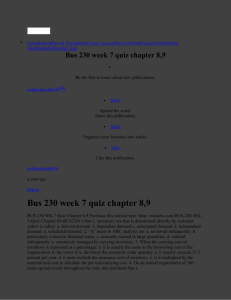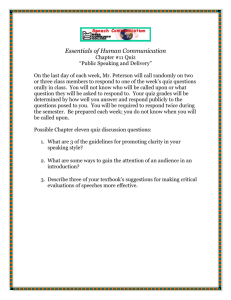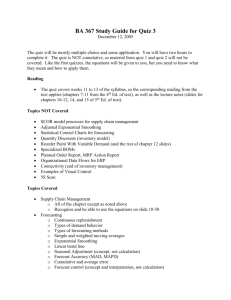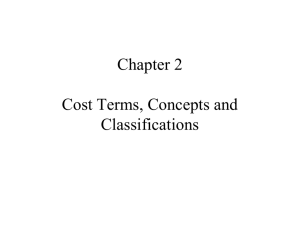BAD 380-01 Operations Management (Bell)
advertisement
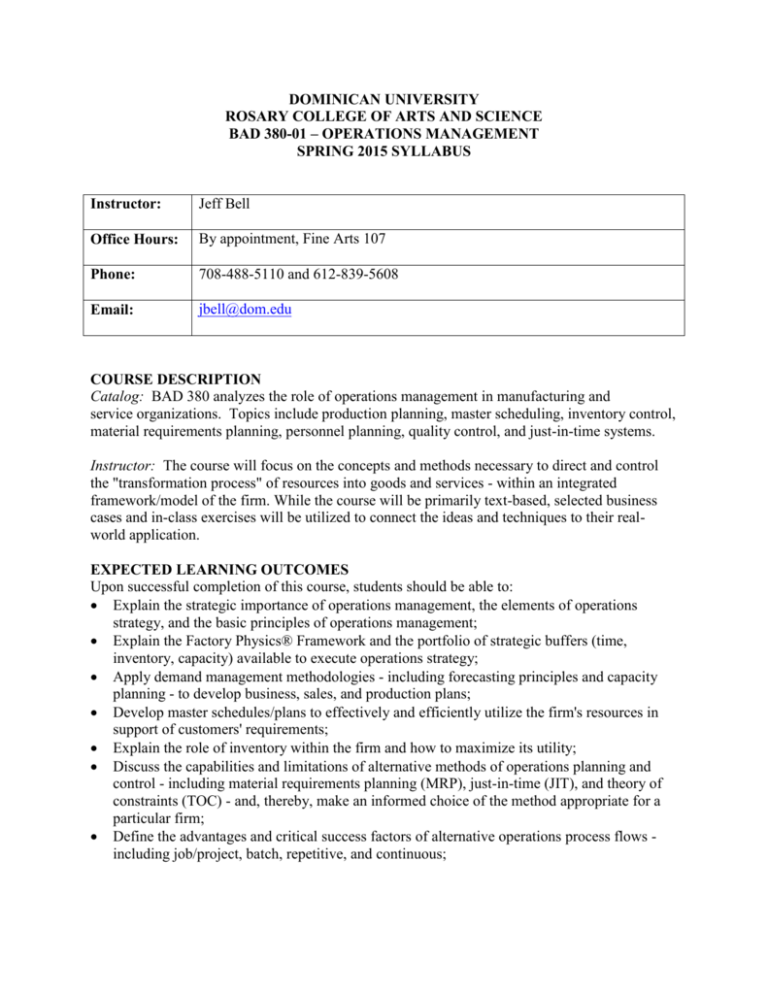
DOMINICAN UNIVERSITY ROSARY COLLEGE OF ARTS AND SCIENCE BAD 380-01 – OPERATIONS MANAGEMENT SPRING 2015 SYLLABUS Instructor: Jeff Bell Office Hours: By appointment, Fine Arts 107 Phone: 708-488-5110 and 612-839-5608 Email: jbell@dom.edu COURSE DESCRIPTION Catalog: BAD 380 analyzes the role of operations management in manufacturing and service organizations. Topics include production planning, master scheduling, inventory control, material requirements planning, personnel planning, quality control, and just-in-time systems. Instructor: The course will focus on the concepts and methods necessary to direct and control the "transformation process" of resources into goods and services - within an integrated framework/model of the firm. While the course will be primarily text-based, selected business cases and in-class exercises will be utilized to connect the ideas and techniques to their realworld application. EXPECTED LEARNING OUTCOMES Upon successful completion of this course, students should be able to: Explain the strategic importance of operations management, the elements of operations strategy, and the basic principles of operations management; Explain the Factory Physics® Framework and the portfolio of strategic buffers (time, inventory, capacity) available to execute operations strategy; Apply demand management methodologies - including forecasting principles and capacity planning - to develop business, sales, and production plans; Develop master schedules/plans to effectively and efficiently utilize the firm's resources in support of customers' requirements; Explain the role of inventory within the firm and how to maximize its utility; Discuss the capabilities and limitations of alternative methods of operations planning and control - including material requirements planning (MRP), just-in-time (JIT), and theory of constraints (TOC) - and, thereby, make an informed choice of the method appropriate for a particular firm; Define the advantages and critical success factors of alternative operations process flows including job/project, batch, repetitive, and continuous; Apply the principles and techniques of total quality management - including quality tools, employee involvement, supplier partnerships, and total preventative maintenance - to assist in meeting customers' requirements; Implement operations productivity improvement techniques in order to enhance operational effectiveness; Utilize location selection and facility layout to support strategic and operational objectives; and Apply operations management concepts and tools within a service environment. PREREQUISITES BAD/ECON-260. MEETING TIME AND DAYS Mondays and Wednesdays 330-445 PM REQUIRED TEXTS Practical Operations Management by Natalie Simpson and Philip Hancock: Hercher Publishing Incorporated, 2013. (ISBN: 978-1-939297-00-6) ASSESSMENT OF STUDENT LEARNING Grading: The table below shows the weights of the various course components: Quizzes (3 @ 20% each) = 60% Case Analyses (3@ 10% each) = 30% Homework, In-class Exercises and Participation = 10% Assignments will be specified in class. Course Calendar: Classes are listed by number as opposed to date because, while the material will be covered in roughly this order, the professional schedules of the guest speakers and Mr. Bell may require some adjustments to the routine schedule. The calendar is subject to change. Upcoming class schedules and due dates for assignments will be reviewed at the end of each class. The material will be reviewed in the following order: Class # 1 2 3 4 5 6 Topics Class Overview, Factory Physics®, Project Management Factory Physics® Framework Project Management Operations Strategy Forecasting Operations Strategy Case 1 7 8 9 10 Operations Strategy Case 1 Quiz 1 Review Quiz 1 Design of Goods and Services 11 12 13 14 15 Managing Quality; Statistical Process Control Capacity Planning Inventory Planning Inventory Planning Case Study 2 16 17 18 19 Quiz 2 Review Quiz 2 Basic Factory Dynamics Aggregate Planning, Materials Requirements Planning, and Supply Chain Management Aggregate Planning, Materials Requirements Planning, and Supply Chain Management Sustainability and Factory Physics Revisited Leadership Communications in Operations Case 3 Quiz 3 Review Quiz 3 20 21 22 23 24 25 26




